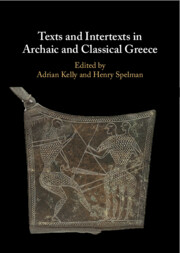Book contents
- Texts and Intertexts in Archaic and Classical Greece
- Texts and Intertexts in Archaic and Classical Greece
- Copyright page
- Contents
- Illustrations
- Tables
- Acknowledgements
- Contributors
- Abbreviations
- Introduction
- Part I Early Intertextuality
- Part II Lyric and Epic
- Part III Drama
- Part IV Conceptual Contexts
- Bibliography
- Index Locorum
- Index Rerum
Introduction
Published online by Cambridge University Press: 14 November 2024
- Texts and Intertexts in Archaic and Classical Greece
- Texts and Intertexts in Archaic and Classical Greece
- Copyright page
- Contents
- Illustrations
- Tables
- Acknowledgements
- Contributors
- Abbreviations
- Introduction
- Part I Early Intertextuality
- Part II Lyric and Epic
- Part III Drama
- Part IV Conceptual Contexts
- Bibliography
- Index Locorum
- Index Rerum
Summary
The first section of this introduction sets the scene for the volume as a whole by briefly considering the history of intertextuality within modern classical scholarship, both Latin and Greek, and then highlighting the special methodological and historical challenges that attend on comparative approaches to early Greek literature. As scholars increasingly agree on the need to read early Greek literature in a comparative way, it is argued, this only makes more urgent the question of how best to do so. The second section of the introduction highlights some of the core methodological, historical, and literary preoccupations of this book by exploring in chronological order two contrastive and complementary case studies from early elegy, one from Tyrtaeus and one from Simonides. Rather than providing a set of definitive answers about how these texts relate to epic tradition and/or particular epics, this section aims to give a sense of the sort of questions at stake in the following chapters. The introduction then concludes by summarising each of those chapters and highlighting interconnections between them.
Keywords
- Type
- Chapter
- Information
- Texts and Intertexts in Archaic and Classical Greece , pp. 1 - 28Publisher: Cambridge University PressPrint publication year: 2024

